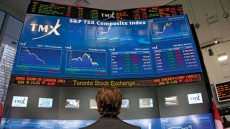TORONTO — The Toronto Stock Exchange's main index rebounded Tuesday morning, making up much of the 420-point drubbing it got in the previous day's tumult as traders adjusted to persistent concerns about the strength of China's economy.
The TSX/S&P composite index was ahead 274.16 points at 13,326.90 after 90 minutes of trading Tuesday, up 2.1 per cent from Monday's close.
Canada's dollar wavered between gains and losses, and was up about one-tenth of a cent (0.12) at 75.28 cents U.S.
The Dow Jones industrial average was up 2.0 per cent or 321.02 points at 16,192.30, the broader S&P 500 index was up nearly 2.2 per cent or 41.37 points at 1,934.58 and the Nasdaq 100 was up about 3.4 per cent or 137.67 points at 4,176.29 points.
Major markets through Europe were also higher and several in Asia also made gains, but China's Shanghai market dropped another 7.6 per cent and Japan's Nikkei 225 dropped nearly four per cent before it closed Tuesday's trading session.
The Shanghai index dropped to an eight-month low following a series of recent plunges that took it below the 3,000 mark for the first time since December.
China's central bank took a step to provide economic stimulus later Tuesday, cutting interest rates for a fifth time in nine months.
Given that China's demand for oil, gas, metals and minerals has been a source of strength for Canada's exporters, there has been a ripple effect on commodity prices including oil — which recently hit multi-year lows below US$39 a barrel.

On Tuesday, the October crude contract was up $1 at US$39.24 a barrel and October natural gas contracts were up two cents at US$2.68. The December gold contract was down $17.60 at US$1,136.
China's economic slowdown started as a side effect of the Communist Party's plan to steer the world's second-largest economy to a "new normal" of lower, steadier growth. It has turned into a nosedive that the party is struggling to reverse.
The party's plans call for economic growth at close to seven per cent this year — high by North American and European standards but low for China — with reduced reliance on trade and investment and increased domestic consumption.
China's exports were supposed to grow by six per cent this year, but instead they are shrinking. New industries such as e-commerce are still too small to offset job losses in traditional businesses, such as manufacturing.
"There are pockets of extreme weakness in China's economy but also areas of strength," Mark Williams, a London-based economist for Capital Economics, told The Associated Press.
"The services sector seems to be doing well, but industry is really struggling."

By the numbers: North American stocks rebound a day after worldwide losses
TORONTO — North American markets rebounded on Tuesday, a day after plunging Chinese stocks triggered a worldwide sell-off. Here are some key numbers:
TORONTO STOCKS: The Toronto Stock Exchange posted triple-digit gains in early trading, up 309.91 points, or 2.4 per cent, from Monday's close. The TSX fell by as much as 5.7 per cent Monday before staging a small rally to close down 3.12 per cent at 13,052.74.
NEW YORK STOCKS: The Dow Jones industrial average rose 2.1 per cent in early trading, after losing 3.57 per cent of its value on Monday. The Standard & Poor's 500 index climbed more than two per cent, after ending down 3.94 per cent Monday.
ASIAN MARKETS: China's Shanghai market dropped another 7.6 per cent and Japan's Nikkei 225 dropped nearly four per cent before they closed Tuesday's trading session. That followed losses the day before of 8.5 per cent and 4.6 per cent, respectively.

EUROPEAN MARKETS: Germany's DAX rose 4.8 per cent, the CAC-40 in France rose 4.18 per cent and Britain's FTSE 100 rose 2.87 per cent. All three markets ended Monday in the red.
CANADIAN DOLLAR: Canada's dollar wavered between gains and losses, at one point down one-hundredth of a cent at 75.4 cents U.S.
OIL: The October crude contract was up 92 cents at US$39.16 a barrel.
OTHER COMMODITIES: The October natural gas contract rose two cents to US$2.67, while the December gold contract was down $16 at US$1,137.60.



